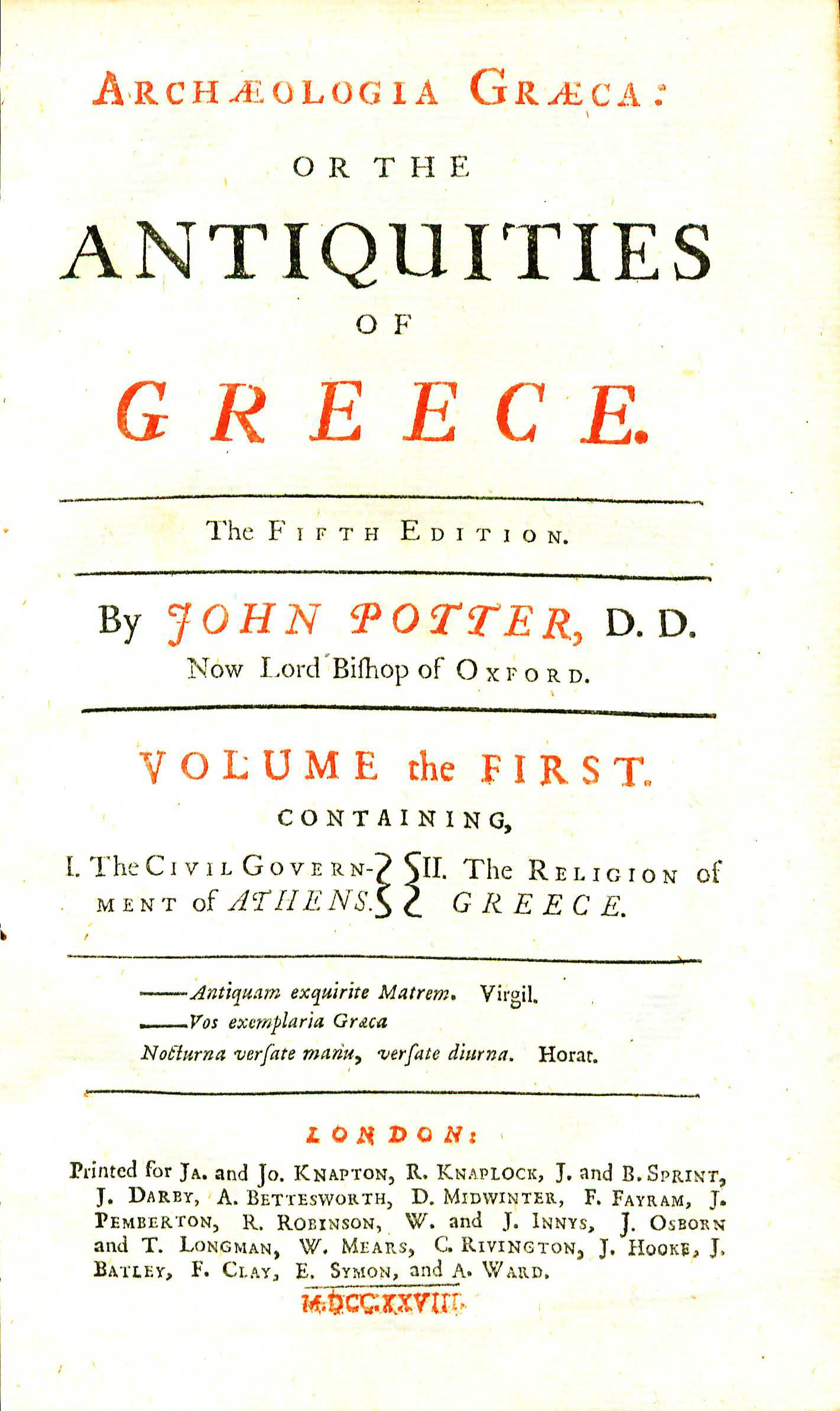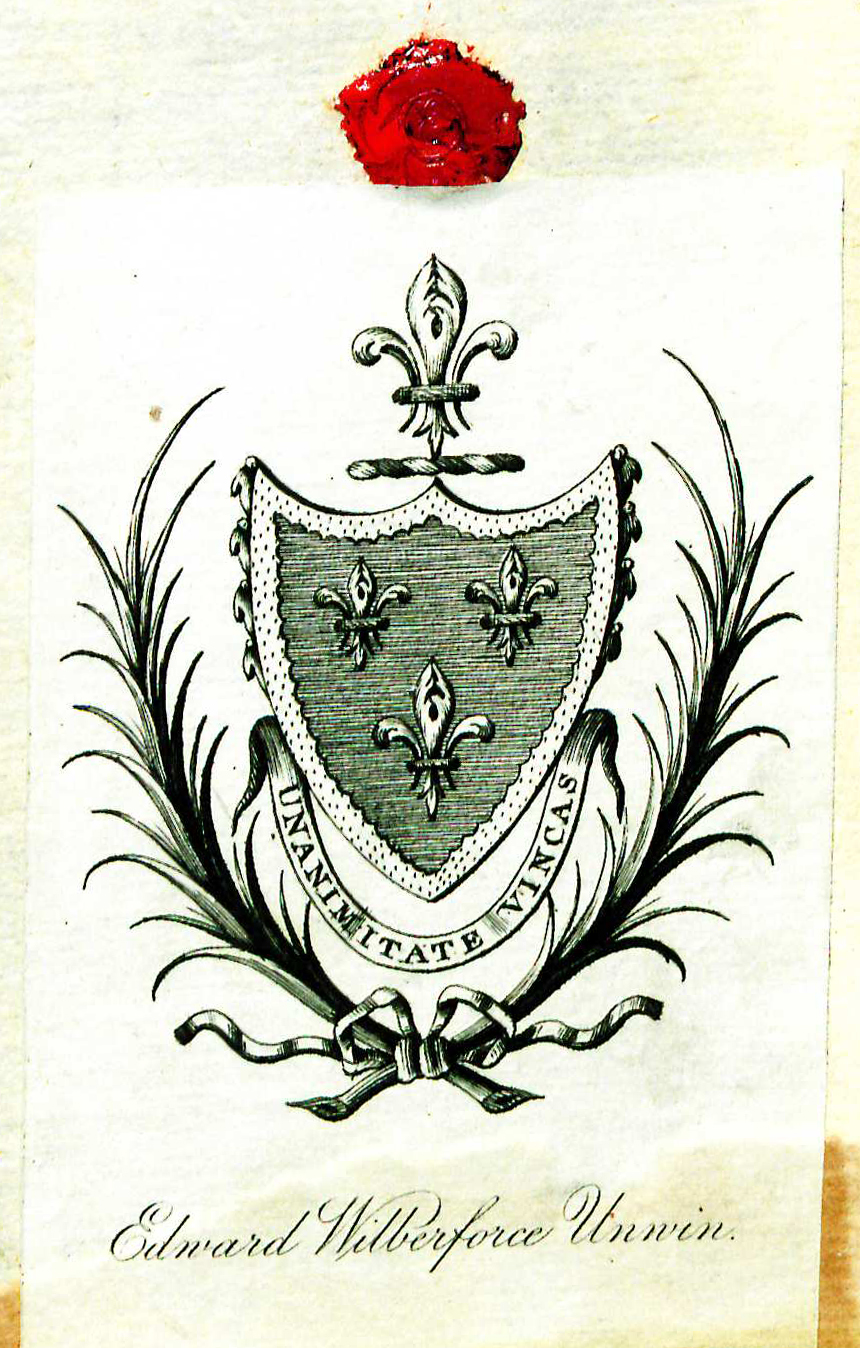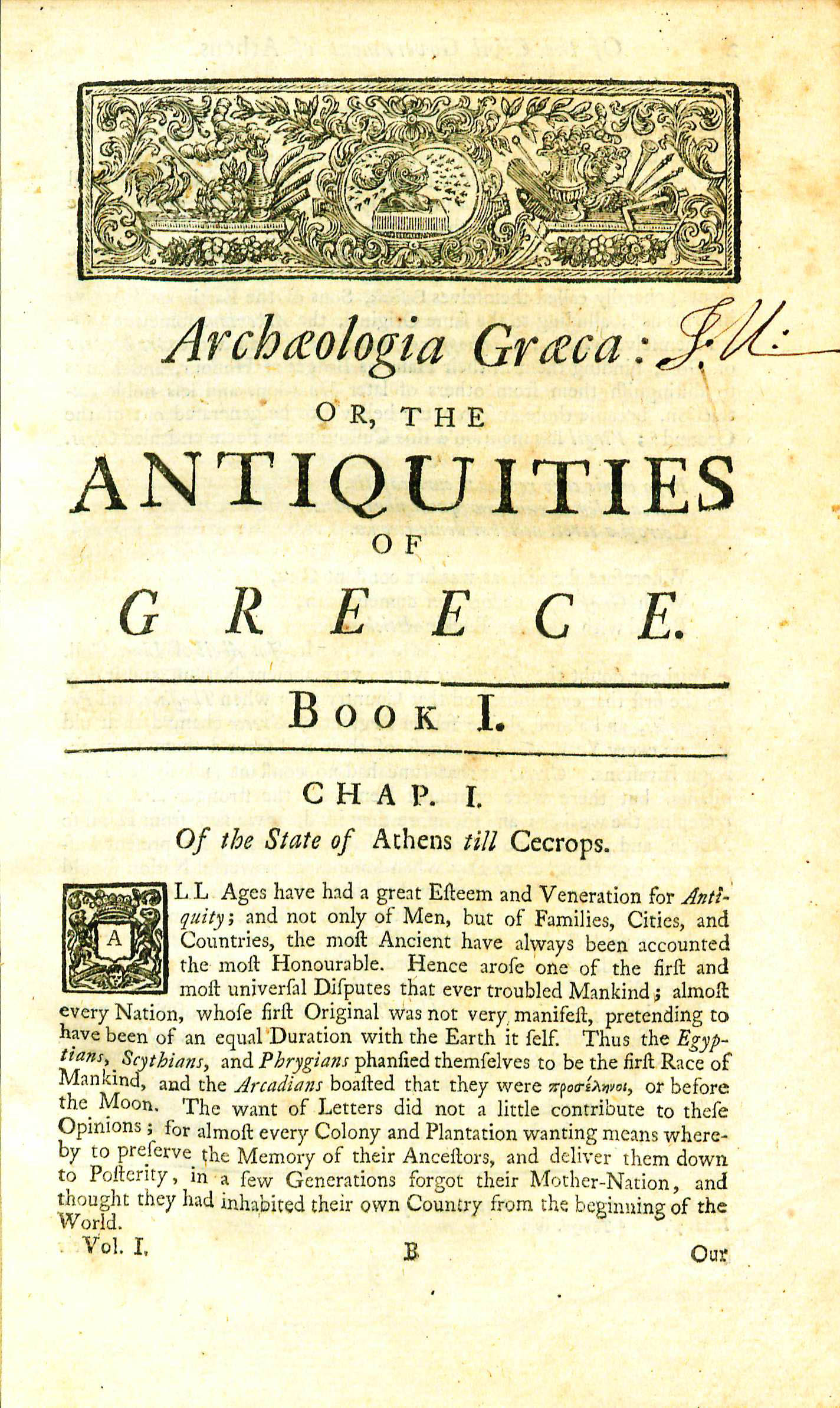Difference between revisions of "Archaeologia Graeca"
| Line 19: | Line 19: | ||
|display=left | |display=left | ||
|caption=Bookplate of Edward Wilberforce Unwin, front pastedown, volume two. | |caption=Bookplate of Edward Wilberforce Unwin, front pastedown, volume two. | ||
| − | }}[http://en.wikipedia.org/wiki/John_Potter_(bishop) John Potter] (1673/4-1747) was born in Yorkshire, England. Potter | + | }}[http://en.wikipedia.org/wiki/John_Potter_(bishop) John Potter] (1673/4-1747) was born in Yorkshire, England. Potter was educated at Queen Elizabeth Grammar School and [http://en.wikipedia.org/wiki/University_College,_Oxford University College at Oxford]. His years in Oxford led him to join the Church of England and abandon the Presbyterian faith of his father, which caused a complete breach with his family. 1694 saw Potter's election as Yorkshire fellow of [http://en.wikipedia.org/wiki/Lincoln_College,_Oxford Lincoln College]; he remained in that position until 1706.<ref>Rebecca Louise Warner, [http://www.oxforddnb.com.proxy.wm.edu/view/article/22612 "Potter, John (1673/4–1747)"] in ''Oxford Dictionary of National Biography'' (Oxford University Press, 2004- ), accessed October 24, 2013.</ref> During his time at Lincoln College, around the age of twenty-four, Potter became a rector. Further clerical positions followed: deacon, ordained priest, chaplain to the archbishop of Canterbury, and [http://en.wikipedia.org/wiki/Bishop_of_Oxford bishop of Oxford]. In 1737, he was appointed [http://en.wikipedia.org/wiki/Archbishop_of_Canterbury archbishop of Canterbury], a position he held until his death ten years later.<ref>''Encyclopedia Britannica Online'', s.v. [http://www.britannica.com/EBchecked/topic/93055/archbishop-of-Canterbury “archbishop of Canterbury”], accessed October 18, 2013.</ref><br /> |
<br /> | <br /> | ||
Potter published several works on the rights of the church in which he opposed contemporary efforts at reform. In addition to these, Potter, skilled in Greek and very interested in classical history, enjoyed a noted reputation for his historical works on ancient Greece such as ''Archæologia Græca''. Originally published in 1697 and 1698, ''Archæologia Græca'' has been praised thus, "The warm eulogies of Gronovius attest the merit of this celebrated work. Potter ... had of course availed himself of the writings of Meursius, but he has also contributed to supersede them."<ref>Henry Hallam, ''Introduction to the Literature of Europe from the Fifteenth, Sixteenth, and Seventeenth Centuries'', 4th ed. (Boston: Little, Brown and Company, 1854), 3:254.</ref> | Potter published several works on the rights of the church in which he opposed contemporary efforts at reform. In addition to these, Potter, skilled in Greek and very interested in classical history, enjoyed a noted reputation for his historical works on ancient Greece such as ''Archæologia Græca''. Originally published in 1697 and 1698, ''Archæologia Græca'' has been praised thus, "The warm eulogies of Gronovius attest the merit of this celebrated work. Potter ... had of course availed himself of the writings of Meursius, but he has also contributed to supersede them."<ref>Henry Hallam, ''Introduction to the Literature of Europe from the Fifteenth, Sixteenth, and Seventeenth Centuries'', 4th ed. (Boston: Little, Brown and Company, 1854), 3:254.</ref> | ||
Revision as of 10:21, 31 March 2014
Archæologia Græca: or, The Antiquities of Greece
by John Potter
| Archæologia Græca | |
|
Title page from Archæologia Græca, volume one, George Wythe Collection, Wolf Law Library, College of William & Mary. | |
| Author | John Potter |
| Published | London: Printed for J. Knapton, R. Knaplock, J. and B. Sprint, D. Midwinter, A. Bettesworth, R. Robinson, W. and J. Innys, J. Osborne, T. Longman, W. Mears, and A. Ward |
| Date | 1728 |
| Edition | Fifth |
| Volumes | 2 volume set |
| Desc. | 8vo (21 cm.) |
John Potter (1673/4-1747) was born in Yorkshire, England. Potter was educated at Queen Elizabeth Grammar School and University College at Oxford. His years in Oxford led him to join the Church of England and abandon the Presbyterian faith of his father, which caused a complete breach with his family. 1694 saw Potter's election as Yorkshire fellow of Lincoln College; he remained in that position until 1706.[1] During his time at Lincoln College, around the age of twenty-four, Potter became a rector. Further clerical positions followed: deacon, ordained priest, chaplain to the archbishop of Canterbury, and bishop of Oxford. In 1737, he was appointed archbishop of Canterbury, a position he held until his death ten years later.[2]
Potter published several works on the rights of the church in which he opposed contemporary efforts at reform. In addition to these, Potter, skilled in Greek and very interested in classical history, enjoyed a noted reputation for his historical works on ancient Greece such as Archæologia Græca. Originally published in 1697 and 1698, Archæologia Græca has been praised thus, "The warm eulogies of Gronovius attest the merit of this celebrated work. Potter ... had of course availed himself of the writings of Meursius, but he has also contributed to supersede them."[3]
Evidence for Inclusion in Wythe's Library
Listed in the Jefferson Inventory of Wythe's Library as Potter’s antiquities. 2.v. 8vo. and given by Thomas Jefferson to his grandson Thomas Jefferson Randolph. The Brown Bibliography[4] lists the seventh edition published in London in 1751 based on the copy Jefferson sold to the Library of Congress.[5] George Wythe's Library[6] on LibraryThing indicates "Precise edition unknown. Numerous two-volume editions in octavo were published, the first in 1706." The Wolf Law Library followed Brown's recommendation and purchased the seventh London edition.
Description of the Wolf Law Library's copy
Bound in contemporary tooled, paneled calf with red calf spine labels. Contains a dollop of impressed red sealing wax with the letter "E" on each front pastedown. Volume two includes the armorial bookplate of Edward Wilberforce Unwin on the front pastedown below the wax. Volume one initialled "J. U." on the first page of text. Purchased from Kenneth Karmiole, Bookseller, Inc.
View this book in William & Mary's online catalog.
References
- ↑ Rebecca Louise Warner, "Potter, John (1673/4–1747)" in Oxford Dictionary of National Biography (Oxford University Press, 2004- ), accessed October 24, 2013.
- ↑ Encyclopedia Britannica Online, s.v. “archbishop of Canterbury”, accessed October 18, 2013.
- ↑ Henry Hallam, Introduction to the Literature of Europe from the Fifteenth, Sixteenth, and Seventeenth Centuries, 4th ed. (Boston: Little, Brown and Company, 1854), 3:254.
- ↑ Bennie Brown, "The Library of George Wythe of Williamsburg and Richmond," (unpublished manuscript, May, 2012) Microsoft Word file. Earlier edition available at: https://digitalarchive.wm.edu/handle/10288/13433
- ↑ E. Millicent Sowerby, Catalogue of the Library of Thomas Jefferson, 2nd ed. (Charlottesville: University Press of Virginia, 1983), 1:19-20 [no.40].
- ↑ LibraryThing, s. v. "Member: George Wythe", accessed on April 21, 2013.
External Links
Read volume one in Google Books.
Read volume two in Google Books.


